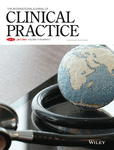Investigation of the disease process and drug combinations in patients with suspected/confirmed COVID-19 using favipiravir
Abstract
Aims
It is aimed to investigate the disease processes and drug combinations in patients who received favipiravir treatment.
Methods
This cross-sectional, analytical and retrospective study included all patients aged ≥18 years (n = 502) who were hospitalised in Samsun, Turkey, for COVID-19 and were given favipiravir from the date between 25 March 2020 and 3 June 2020.
Results
In total, 58.6% (n = 294) of the patients were male and 24.5% (n = 123) were between the ages of 71 and 80 years. During the first case process, the mortality rate was 19.9%, whereas the rate of those who were discharged as is/followed up at home for 14 days was 37.3%. During the second case process, the mortality rate was 6.2%, and the rate of those who was discharged as is/followed up at home for 14 days was 65.6%. The mean length of hospital stay was 10.61 ± 8.17 days for the first and 7.97 ± 4.16 days for the second hospitalisation; this difference was significant. Mortality risk of those who used Tocilizumab or vitamin C beside Favipiravir was higher than those who did not. The length of hospital stay was higher in patients using tocilizumab than in those who did not (P < .001).
Conclusion
Administration of favipiravir later in the course of the disease makes it difficult to achieve the true efficacy expected from the drug and also makes it difficult for other combination drugs to contribute to survival. Favipiravir may also be effective in case of recurrence.
DISCLOSURES
The authors declared no potential conflicts of interest with respect to the research, authorship and/or publication of this article.
Open Research
DATA AVAILABILITY STATEMENT
Data sharing is not applicable to this article as no datasets were generated or analysed during the current study.




